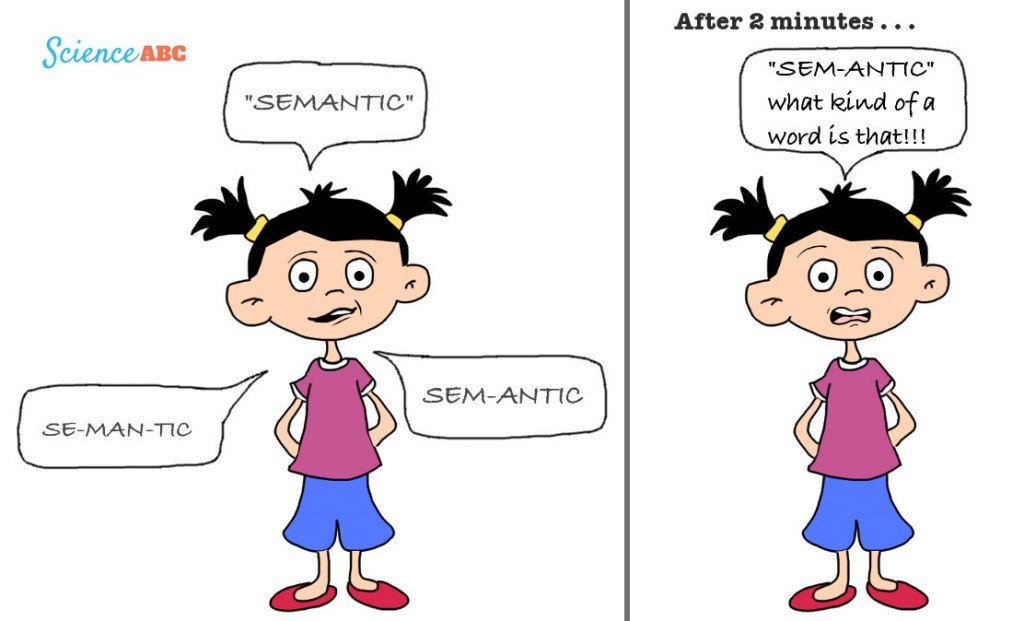Saying the Same Word Over and Over Again Starts to Sound Weird
Semantic Satiation: Why Does A Word Sound Weird When Repeated Multiple Times?
Updated on: 17 Jan 2022 past Ashish
"'Wording'. What a great discussion that is, right? 'Diction'. I think the word is so slick that I like to say it over and over again.
This guy has great diction.
You lot should really work on your diction.
Wording is all nearly choosing the right words in the right places.
Wording. Hmm.. wording… d-i-c-t-i-o-n… diction… di– wait a infinitesimal, why does the discussion audio so weird at present?"
Does this situation sound familiar? Has it always happened to you that a perfectly normal word, when repeated over and over and over again, all of a sudden loses all its meaning and starts sounding weird? This includes both prolonged viewing of the word and its active repetition (oral or written).
If this has happened with yous, then let me tell you this:

This phenomenon (namely when a discussion loses all its meaning when repeated multiple times), in fact, is quite common, and it also has a fancy proper name: semantic satiation.
Recommended Video for you:
What is semantic satiation?
Semantic satiation is the proper name of a psychological phenomenon wherein the repetition of a word, whether it's visual or oral, causes it to lose its meaning for the viewer/listener, and makes it seem like information technology's just a meaningless sound. Historically, the term 'semantic satiation' has been used to refer to the subjective loss of meaning that comes as a result of prolonged exposure to a discussion.

The term 'semantic satiation' was coined by Leon Jakobovits James (a psychology professor at the University of Hawaii) in his 1962 doctoral dissertation at McGill University; he wrote his doctoral thesis on the phenomenon. According to James, it'due south a kind of fatigue (reactive inhibition). He says, "when a brain cell fires, it takes more energy to fire the second fourth dimension, and still more the third fourth dimension, and finally the fourth time, it won't even respond unless you lot wait a few seconds." He adds that the more times yous repeat a discussion, the more energy information technology takes.
Although, y'all can feel semantic satiation with practically every discussion, some words lose significant faster than others. These are usually the words with whom you have "stronger associations". For instance, the word "Cyberspace" would plow into brain mush far less quickly than the word "semantic".

Semantic satiation can be experienced with whatever word.
Only why does really happen? What's going on here?
Reason behind semantic satiation
When yous hear, read or speak a word, your brain isn't really listening to its sound; rather, it's translating those sounds into an thought. That idea is and so put together with other words, to form a more complex thought. However, when you echo a discussion multiple times, your encephalon ceases to recognize it as a word (which after keeps it from translating it into an idea), and breaks it down into sounds. These sounds, of grade, have nothing to practise with the inherent pregnant of the word. That'south why a purely normal discussion begins to sound like gibberish.

The longer a word is 'played' with, the more meaningless it becomes.
Think of it this way: our brains accept an incredible ability to accept words and understand an unabridged concept associated with them. For instance, when you think of the word "book", you instantly conjure up the epitome of a book. You may accept boosted details like color, thickness, cover etc. in the background, only you instantly connect with the idea of a book the moment you await at the word or hear/speak it.
Still, when you starting time repeating it actively, the brain refocuses on the actual word "volume". Then, it thinks near the word, its intonation, audio, the letters it comprises etc. These things obviously accept nothing to practise with the thought of a book, which is why the discussion seems meaningless the more times it's repeated.
Interestingly, the idea of semantic satiation is used to develop techniques to reduce speech anxiety by stutterers. The repetition of specific words leads to semantic satiation, which, in turn, leads to a reduction in the intensity of negative memories and emotions that are triggered while speaking.
Did you lot always imagine that something yous considered a random 'thing' with words could actually be used to help patients with speech defects?
I doubt it. Doubtfulness information technology. Doubt… doubt… d-o-u-b-t…
Suggested Reading
-
How Emotions Are Fabricated: The Secret Life of the Brain -
A Thousand Brains: A New Theory of Intelligence -
Brain
Was this article helpful?
Yeah No
Help u.s.a. make this article improve
Follow ScienceABC on Social Media:
Virtually the Author
Ashish is a Scientific discipline graduate (Bachelor of Science) from Panjabi University (Republic of india). He spearheads the content and editorial fly of ScienceABC and manages its official Youtube aqueduct. He's a Harry Potter fan and tries, in vain, to use spells and charms (Accio! [insert object name]) in existent life to get things done. He totally gets why JRR Tolkien would create, from scratch, a language spoken by elves, and tries to bring the same passion in everything he does. A large gentleman of Richard Feynman and Nikola Tesla, he obsesses over how thoroughly science dictates every aspect of life… in this universe, at least.
.
Science ABC YouTube Videos
-
 Black Holes Explained: What Is a Blackness Hole? How They Course?
Black Holes Explained: What Is a Blackness Hole? How They Course? -
 Gut Microbiome Explained in Unproblematic Words
Gut Microbiome Explained in Unproblematic Words -
 Particle accelerators: What are they, how do they work and why are they important to united states?
Particle accelerators: What are they, how do they work and why are they important to united states? -
 How Practise Neurons Work?
How Practise Neurons Work? -
 How Scientifically Accurate Is The HBO Miniseries Chernobyl?
How Scientifically Accurate Is The HBO Miniseries Chernobyl? -
 Cellular Respiration: How Do Cell Get Energy?
Cellular Respiration: How Do Cell Get Energy? -
 Multiverse Theory Explained: Does the Multiverse Really Exist? Truth of Multiple Realities
Multiverse Theory Explained: Does the Multiverse Really Exist? Truth of Multiple Realities -
 What Exactly is Spacetime? Explained in Ridiculously Uncomplicated Words
What Exactly is Spacetime? Explained in Ridiculously Uncomplicated Words
Source: https://www.scienceabc.com/eyeopeners/semantic-satiation-why-does-a-word-sound-weird-when-repeated-multiple-times.html#:~:text=Semantic%20satiation%20is%20the%20name,it's%20just%20a%20meaningless%20sound.



0 Response to "Saying the Same Word Over and Over Again Starts to Sound Weird"
Postar um comentário